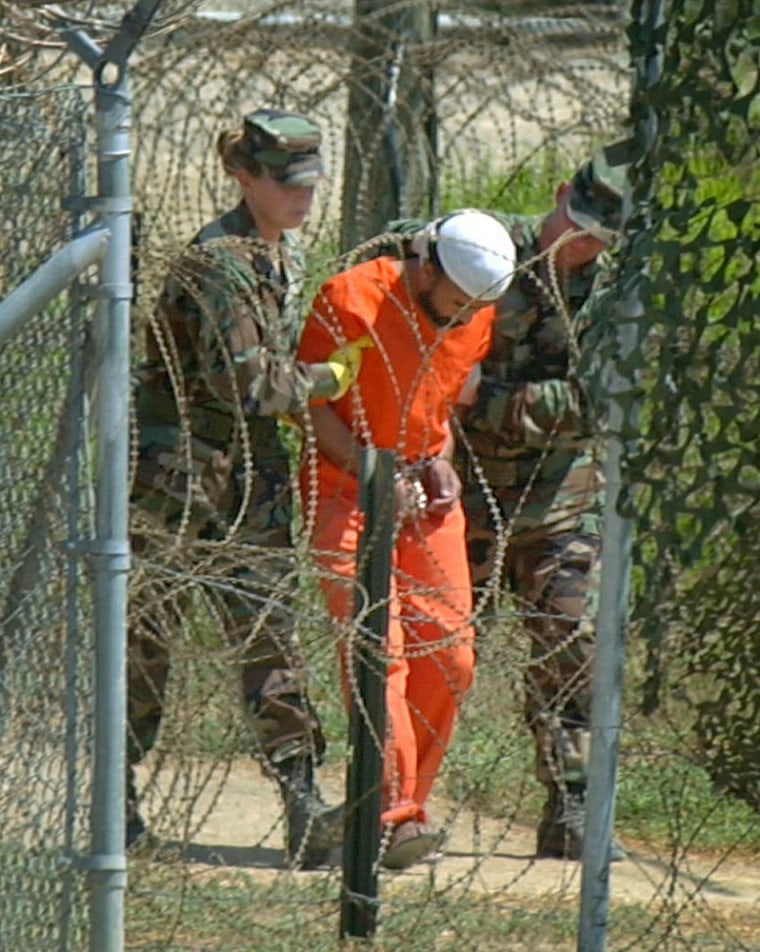New documents on the Guantanamo detainees suggest the Bush administration has cast a wide net in its war on terror. But the U.S. has often come up empty as American troops picked up suspects with descriptions as varied as a Kazakh apple seller and a Pakistani millionaire.
Evidence against the apple seller, for example, showed he had been captured by the Taliban and forced to work as a cook.
In fact, the man told his U.S. military tribunal, he was only a cook’s helper, and had never heard of al-Qaida or the Taliban until he was kidnapped and conscripted by Afghanistan’s former hardline Islamic regime.
“I never had a weapon. I never carried a weapon with me and I’ve never been in any kind of armed fight,” he said in one of hundreds of military hearings held to determine whether detainees at the U.S. prison at Guantanamo Bay are being properly held without charges as “enemy combatants.”
These and other details emerging from about 5,000 pages of transcripts released Friday suggest the Bush administration has picked up any number of low-level suspects along with admitted al-Qaida and Taliban members and the rare high-value target, a Pakistani millionaire who twice met Osama bin Laden.
Terror fight cloaked in secrecy
The Pentagon was forced to release the documents by a federal judge in response to an Associated Press lawsuit, but much of the administration’s war on terror remains shrouded in overwhelming secrecy. The transcripts reveal only unclassified information, for example — the detainees and their representatives are not told what other evidence the military might have against them.
The apple seller’s weak link to the Taliban or al-Qaida does not appear to be unique at Guantanamo Bay, the mostly unredacted transcripts reveal.
Some detainees say they attended training camps U.S. authorities believe were run by al-Qaida or militants linked to the terror group. A few admit to meeting bin Laden. Some are prominent, like the governor of Afghanistan’s Herat province or the Taliban’s minister of commerce, or the Pakistani millionaire, a man with businesses in the U.S. and ties to Middle Eastern leaders.
Some were picked up after their names were found on lists at al-Qaida safe houses in Pakistan, or taken from the battlefields of Afghanistan shortly after U.S. troops invaded and helped drive out the Taliban.
Implicated by a watch
The evidence against others can seem flimsy. In at least one case, it appears to include only the fact that the suspect wore a Casio watch — a brand allegedly favored by terrorists for use as bomb timers.
And some of those captured seem to be small fry indeed, such as Hafizullah Shah, a farmer who said he had never left his village before being arrested because he wore an olive drab jacket.
“I was just walking in the street and I was captured,” Shah said. “The next thing I found out is that I am sitting here.”
It is impossible to gauge from the transcripts alone whether someone is improperly held at Guantanamo Bay, where the U.S. now holds about 490 detainees.
Again and again, detainees are told that there is other evidence against them, but they are not permitted to see it.
The Bush administration has kept almost all information about the detainees secret since opening the prison in January 2002.
Few new detainees
But the administration itself seems to have acknowledged that many suspects do not belong at Guantanamo. The military has stopped bringing new detainees to the prison and has transferred or released about 270. The Pentagon said it would reduce the detainee population by about 30 percent with more transfers and releases.
The apple seller’s fate is unknown. His name apparently was not mentioned in his hearing, and so does not appear in the unredacted transcripts that have revealed many other detainee names for the first time. But he had a theory about why he was being held.
“I always knew America as a democratic country and always heard positive things about America,” he told the tribunal. “I believe that after 9/11 America became very aggressive and that’s probably the only reason I’m here.”
